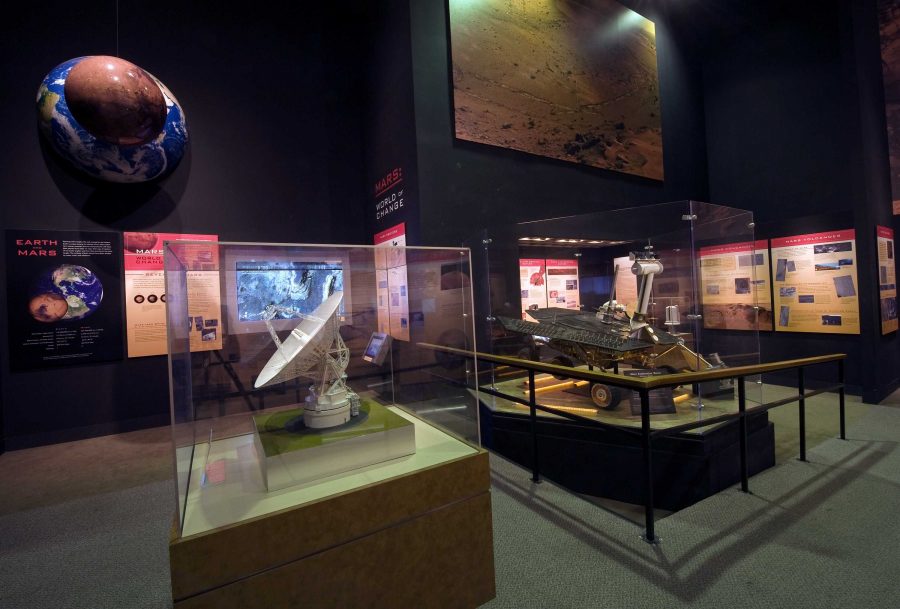Mars mission leads humanity
Mars exhibit at the Smithsonian. Colonization of Mars inevitably near. Photo credit: Jon Suarez
March 16, 2015
Time machines, hover boards, and flying cars are only a few examples of the Hollywood envisioned future. With a chuckle, most would consider it all somewhat out of the question. However, the pace at which technology has been flowing recently may bridge the gap between sci-fi and reality once and for all.
The mission known as the Mars-One mission is planning a colonization of the big red planet, Mars. With such high demand for the adventure of a lifetime, there have been three rounds of selection, narrowing all 200.000 applicants down to a total of 100. These 100 candidates, also known as the Mars 100, will be narrowed down even further to a total of 24 astronauts. The beginning of the voyage is scheduled to begin with the first unmanned mission in 2018 to find the proper grounds for establishing a camp. Then followed by crews of 4 departing every 2 years starting in 2024, humanity will begin the colonization of Mars.
Breathtaking, isn’t it?
Although it is only in the early stages of development, the Mars-One mission has gotten some recognition lately in the LA Times. A member of the Mars 100, Elena Shateni, was interviewed by the Times to see what she had to say on leaving Earth, only to never return.
“This is a dream job for me — a dream job!”, the candidate told the Times. “I was always attracted to the unknown, to know what is out there,”
Shateni clearly shares that passion for adventure which drives us as humans to the edge of science and knowledge. That undying desire to see and explore is one attribute that makes us human, and it will excite many as we begin the landing cycle in the not-to-distant future.
Before we can land a ship though, we need to overcome some obstacles here on Earth. Professor Erick Reese, astronomy instructor and qualified astrophysicist, feels that the journey to Mars will most certainly be a challenge.
Food and water are a couple of Rees’s main concerns. Finding, creating, or bringing the amount of supplies needed will determine the fate of these astronauts. Other concerns he mentioned were compatibility between the astronauts, the limited amount of resources Mars has to offer, and on a much larger scale the contamination of planets.
“Consider new species from other continents invading a foreign continent,” said Reese. “That species destroys the local environment, but that’s only Earth to Earth. On a planetary scale, could you imagine what could happen if a strain from somewhere else came?”
Though these are some essential points to cover the, apparent issues once overcame could represent a series of accomplishments for the human race, and along the way we could discover and grow.
“It’s just like the first astronauts, or [Chuck] Yeager, he broke the sound barrier and no one knew what’s gonna happen,” said professor Reese. “This is one of those ‘you don’t know whats gonna happen until you do it’ kind of things. It’s exciting, and scary at the same time.”
Once again, we as a human race will look up to the skies, together, to see the ever-growing height of our knowledge. It is this passion in humanity that drives us. This passion that remains undisturbed through centuries of exploration. We still seek more because we want to know more.
For the LA Times full questionaire with Elena Shateni, click here: http://www.latimes.com/opinion/op-ed/la-oe-0304-morrison-shateni-20150304-column.html#page=1






